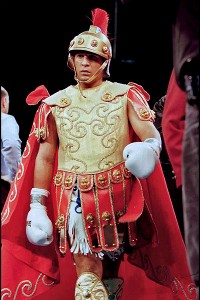Hector “Macho” Camacho is brain dead. The headline above may sound flippant, but with all respect to Mr. Camacho, to his friends and family and to his millions of fans, no flippancy is intended. I’m just trying to make this point: brain death is death. Disparate cells and organs, parts of the body that once made up a thrilling and flamboyant boxer, are still alive. They might remain so indefinitely, through extreme medical intervention. But make no mistake: the most definitive and irreversible phase of expiration has already occurred. There’s a body laying in a hospital in San Juan, Puerto Rico, but Macho Camacho has already departed.
 Hector Camacho is one of the most memorable boxers of the ’80s and ’90s. He won championships in both the lightweight and junior lightweight divisions. He was known to be flashy and confident, quirky yet with a genius for self-promotion. All of that was backed up, however, with prowess in the ring. He was tireless and lightning-quick. His career record is impressive: 79 wins with 45 KOs, out of a total of 88 fights. Perhaps most memorably, he’s the man who ended Sugar Ray Leonard’s career, with a knockout.
Hector Camacho is one of the most memorable boxers of the ’80s and ’90s. He won championships in both the lightweight and junior lightweight divisions. He was known to be flashy and confident, quirky yet with a genius for self-promotion. All of that was backed up, however, with prowess in the ring. He was tireless and lightning-quick. His career record is impressive: 79 wins with 45 KOs, out of a total of 88 fights. Perhaps most memorably, he’s the man who ended Sugar Ray Leonard’s career, with a knockout.
Macho was not without his failings. As his boxing career wound down, he struggled with drugs and even petty crime. He was arrested in Mississippi in 2005 for burgling an electronics store and possession of ecstasy. He later violated his parole for that offense, and did some time. Earlier this year he was charged in Florida for assaulting his teenage son.
Hector “Macho” Camacho suffered brain death on November 20th, after being shot in the face and neck in Bayamon, Puerto Rico, in what might have been a drive-by shooting. It’s unclear at this time whether or how Camacho knew his attackers, or if he was a random victim. It’s worth noting that Camacho was shot three times in early 2011, in what was apparently an attempted carjacking, in nearby San Juan.
At last report, Camacho’s family is considering ending life support.
We say farewell, then, to Hector “Macho” Camacho. He was subject to chaos and brutality, and whether it’s right and proper that anyone should live a life like that in name of entertainment, we have to acknowledge that in our culture, that’s how it is. He accepted that burden, and willingly entertained us. Most importantly, he was a talented, glorious boxer, and he will be missed.
Â